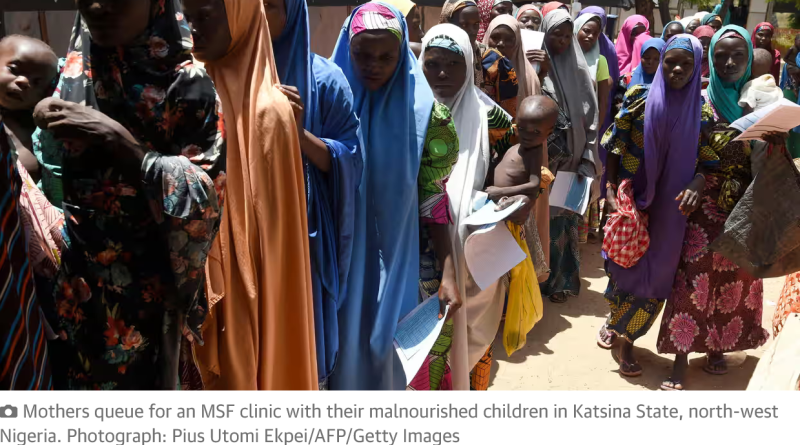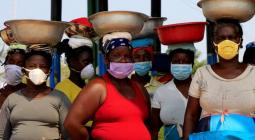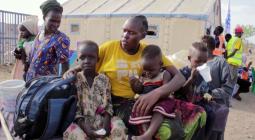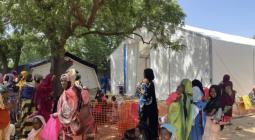Child malnutrition crisis in Nigeria amid rural violence and soaring food inflation

An unprecedented number of children in northern Nigeria are suffering from acute malnutrition, aid workers in the country have said.
Nigeria has the “largest number of food insecure people globally” at 31.8 million, the UN Food and Agriculture Organization office in the north-eastern city of Maiduguri said.
Médecins Sans Frontières, which is working in seven states, said its facilities were so overwhelmed that children were being treated on mattresses on the floor. MSF said it admitted 1,250 children in April to an inpatient therapeutic feeding centre in Maiduguri, twice the figure for the same period in 2023.
Dr Simba Tirima, MSF’s Nigeria representative, said: “In all these places we’ve seen, at least in some cases, double what we saw last year or at least a more than 60% increase in the patients admitted. We have a crisis at hand. We have an emergency at hand, and those kids that are severely malnourished definitely need treatment.”
Severe acute malnutrition has also led to other conditions, such as tuberculosis and acute diarrhoea, and stunted children’s growth. More than 52,000 patients were diagnosed with severe acute malnutrition across seven states in 2023 and 2,693 of them died, according to MSF figures.
The reasons for the increase in malnutrition are well noted: food inflation is close to 30% as Africa’s most populous country is experiencing worsening food insecurity. A third of the country – amounting to more than the combined population of the UK, Ireland and Denmark – live on less than £1 a day.
Meanwhile, farmland has been abandoned in parts of the north because of gangs kidnapping, extorting and in some cases killing farmers. The Nigerian newspaper the Punch reported that 165 farmers were killed in the first three months of this year.
About 1.2 million people were displaced in eight states in central and north-west Nigeria by the end of 2022 because of violence, according to the UN’s International Organization for Migration. In that same period, about 2.3 million others were displaced in the north-east, where jihadist groups such as Boko Haram continue to run amok.
The insecurity and economic instability have made food expensive. Food reserves in some villages have been depleted as there has been little or no growth in household incomes, some local people told aid workers.
In January, a report by the US Department of Agriculture and the Global Agricultural Information Network revealed that Nigeria had become the second country in Africa, after South Africa, to embrace genetically engineered corn.
A month later the government ordered the release of 2,000 metric tonnes of grains from the federal reserves, with the agriculture minister, Abubakar Kyari, saying: “Food security is national security”.
But aid organisations say millions of people are still at risk of famine as Nigeria enters the lean season, which is usually from June to September. The World Food Programme has already projected that 26.5 million people in Nigeria could face acute hunger by the end of this period.
Other experts say the position could deteriorate even before then and have called for immediate funding to save millions of vulnerable children.
“We’re not even in the middle of that lean season,” Tirima said. “We need other actors to come in. MSF is just one organisation. In fact, what we do is a drop in the bucket … we are nowhere near addressing the immediate crisis that we face.”
“A child who died yesterday of malnutrition is a tragedy,” he added. “A child who might die tomorrow because of malnutrition is preventable.”






